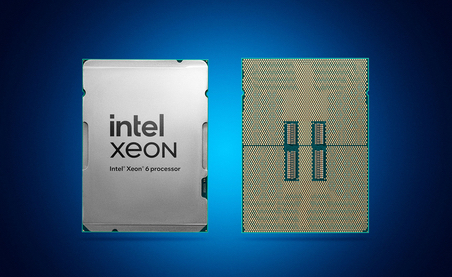Intel Ups the AI Ante With New Chips for Data Centers

In the hypercompetitive arena of artificial intelligence, Intel unveiled its latest gambit: the Xeon 6 processor.
The next-generation AI chip, which debuted Tuesday (June 4) at Taiwan’s Computex tech conference in Taipei, promises a combination of enhanced performance and power efficiency to tackle the demands of data center workloads.
“AI is driving one of the most consequential eras of innovation the industry has ever seen,” said Intel CEO Pat Gelsinger in a statement. “The magic of silicon is once again enabling exponential advancements in computing that will push the boundaries of human potential and power the global economy for years to come.”
Keeping up With Competitors
The announcement follows similar revelations from competitors Nvidia and AMD, which showcased their own cutting-edge AI chips earlier this week. Intel’s move underscores the competition among tech giants vying for dominance in the booming AI sector.
These processors drive advancements in diverse fields, from healthcare to autonomous driving. As businesses and researchers seek more computational power to process and analyze vast amounts of data, the performance of these chips can directly influence the pace and efficiency of technological progress.
Six months ago, Intel launched its 5th Gen Intel Xeon processors, and two months prior, it introduced the Gaudi 3 processor, designed specifically for AI model training and deployment. The company’s latest revelations include a notable price advantage: the Gaudi 2 and Gaudi 3 AI accelerators will be available at lower prices than rival chips.
Intel’s aggressive pricing strategy and continuous innovation highlight its commitment to reclaiming leadership in a lucrative and competitive market. For stakeholders and consumers alike, the race to develop more powerful AI chips means faster, more innovative technology that can transform industries and, ultimately, daily life.
AI is progressing rapidly, with the potential to impact various sectors such as healthcare, finance, manufacturing and transportation. However, the substantial computational resources needed to develop and deploy complex AI models have made the technology inaccessible for many organizations. Intel is now offering new products that aim to address this challenge by making AI more efficient and affordable for businesses of various sizes.
Intel’s latest Xeon 6 processor family is designed specifically to meet the requirements of AI and high-performance computing. The initial Xeon 6 chips, which are now available, feature energy efficiency and a high number of cores. For more computationally intensive tasks, Intel’s Gaudi accelerators offer a price-performance advantage compared to competitors such as Nvidia’s H100.
Intel is also partnering with Microsoft, Acer and Asus to bring these AI technologies to market.
“The entire Xeon 6 platform and family of processors is purpose-built for addressing these challenges,” said Acer Chairman and CEO Jason Chen in a statement.
AI PCs
Beyond the data center, Intel is targeting the rapidly growing AI PC market with its forthcoming Lunar Lake processor. Set to debut in the third quarter of 2024, Lunar Lake promises a leap in on-device AI capabilities while reducing power consumption by up to 40%.
The advancement of AI technology has the potential to revolutionize various industries, but widespread adoption has been hindered by high costs and limited accessibility. Intel’s efforts aim to address these challenges by developing more affordable and user-friendly AI solutions. By making AI more attainable for a broader range of businesses, Intel is positioning itself as a key player in the democratization of the technology.
The increased availability of AI tools and resources is expected to drive innovation across sectors, as more organizations gain the ability to use the power of AI in their operations. This could lead to the development of novel applications and use cases, as businesses tailor AI to their specific needs and challenges. As a result, we may witness a surge in AI-driven products, services and solutions that enhance efficiency, productivity and decision-making processes.
However, the impact of Intel’s initiatives extends beyond individual businesses. By facilitating the widespread adoption of AI, Intel is contributing to the broader evolution of computing itself. As AI becomes more deeply integrated into various systems and processes, it has the potential to reshape the way we interact with technology and data. This shift could have far-reaching implications for the future of work, communication and innovation, ultimately transforming the landscape of computing.
For all PYMNTS AI coverage, subscribe to the daily AI Newsletter.



